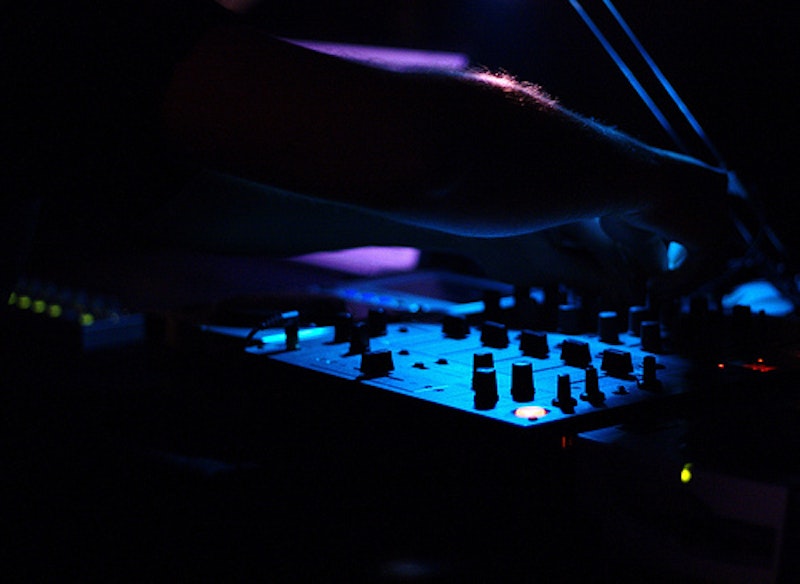Down a dark, sticky staircase descending from the clamor of a bustling weekend D.C. boulevard, my friend and I fell into the rabbit hole known as U Street Music Hall a couple of weeks ago. Past the disinterested hipsters taking cover money was a dense mess of D.C. vitality crammed into a basement sweatbox. It was everything I pray for in a club: diverse, crowded, unpretentious, outrageous and, best of all, playing electro and house music.
As electro drips increasingly into mainstream pop music—in the form of acts like Lady Gaga, Katy Perry and Ke$ha—it’s been amazing to see how it has developed, especially in the last two years. It has gone from the disco-inspired electronica of Euro clubs and indie scenes to someone like Perry, who is definitely not indie despite that killer disco hook on “California Gurls.” If you look at Billboard’s chart of Top 20 songs, you’ll see a list dominated by electro and hip-hop tracks (I’m including modern R&B as part of the hip-hop paradigm). As of this writing, only two weren’t a part of either genre: Train and country stars Lady Antebellum.
Hip-hop and electro have become natural partners atop the mainstream lists. Unlike the monolithic musical entities of rock music, even my favorite band Radiohead, both hip-hop and electro lend themselves to and encourage artistic synergy and collaboration, even between the two genres. My favorite track of the past year has been G.L.O.V.E.S.’s remix of Van She’s “Changes.” I don’t really care for Van She’s un-remixed songs; I don’t like G.L.O.V.E.S.’s original music; but the two combine to produce one of the best tracks ever, a danceable, melodic piece of glory that no sunny Sunday should ever go without. With hip-hop and electro you can mix eras—Drake, Eminem and Lil Wayne on the same track or Justice remixing Daft Punk (or reverse: Soulwax remixing Justice!). Both genres rely on a sturdy underground scene, anchored in mixtapes, remixes, and club spins.
Unlike the demarcated, standalone albums of a Radiohead, music from these scenes comes out in a trickle, originally and still through mixtapes but, with Myspace and iTunes, increasingly through online release. I’m one of those crazy folks that still buy CDs, but lately I don’t even have that option—the music seeps out through digital-only singles and free remixes. Electro in its current form would be impossible without the interconnectivity of the Internet. The club trends in Europe, Australia, and Japan are now instantly available to artists in the middle of Georgia (like chillwave rising star Washed Out). The remixing back and forth can allow an obscure Minneapolis DJ like Gigamesh to get his remix on a French-record-label-sponsored single and introduce him to me, sitting as I was, in New Delhi, India.
Some people, like The Atlantic’s Megan McArdle, fret that the Internet and free music will destroy the music industry—removing talent from the pool of hungry artists and losing the unifying promotion power of the record labels. But the Internet has really opened up and globalized the potential markets, especially for electro artists. International competition and collaboration within a music scene can only stretch its horizons. In a scene so reliant on a club culture where DJs can’t drop a dud, the best have to come out. Moreover, I find it hard to believe that a group of young people living off nothing to produce music would suddenly decide to quit if instead of millions of dollars they were “only” promised a life of traveling the world, having their bills paid, getting every day off, and partying in a club all night.
This opportunity to DJ—which often has a much longer shelf-life than a hot album or track—is something that a lot of electro and some hip-hop acts (such as Q-Tip) have embraced. Groups like Passion Pit and Van She, which are solidly in the electro-rock side of things, also do pure dance remixes of both others’ music and their own. You have acts like Calvin Harris, whose Ready for the Weekend is my favorite album of the last couple of years, who barely plays live shows despite having two full albums of awesome, perform-able tracks—instead he DJs club gigs.
Electro music has provided worldwide exposure to what were before provincial, mid-level-club DJs. I now know the name of dozens of DJs that never play sold-out megaclubs or massive festivals like Tiesto or Paul Oakenfold do. They were formerly restricted to their own country or even just their own city. With this globalization, I am now beginning to see some of their names popping up in indie music festivals around the world, including in America. It has excised the anonymity from the profession, giving incentive for those who just play music to get involved in the production as well.
Best of all is that in the club world, the playlist is king, almost never restricted to a single artist. Those creating the music know that a great track off their album, even unreleased as a single, can have a chance at being discovered and remixed or played by a DJ. In a world where my primary interaction with music is no longer physical, contained CDs but the playlists I generate in my iPod, I essentially have the same mindset as a DJ. Now, I can sift through an album online and decide if the entire thing is worth purchasing or just a song or two.
I’ve found that electro artists—like Justice, Digitalism, or Calvin Harris—treat each CD like a club set, a coherent grouping with a definite sound, but one with wildly different tracks, each offering something else to a potential club set or playlist because that’s where they’re putting the music themselves. In this age of technology, like with so much else, maybe the rise of electro can finally bring the fall of the album-filler track. At the very least, I just hope it brings about more U Street Music Halls.

